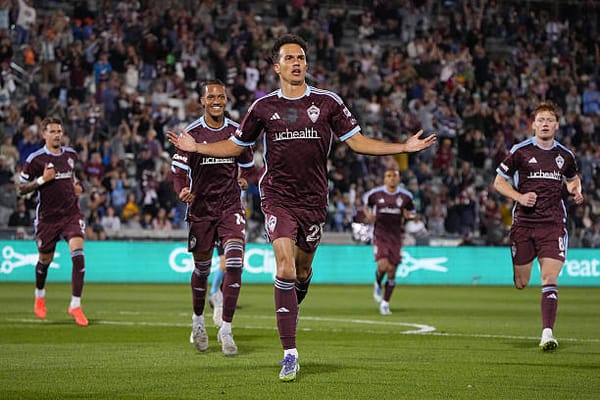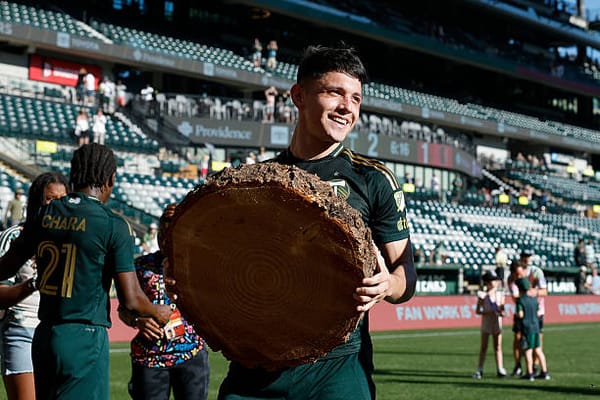Steering the Canoe
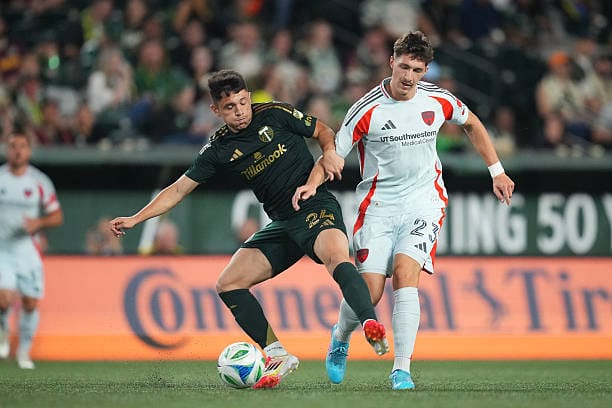
The Portland Timbers had a chance to cement their playoff credentials tonight. Instead, they drew 2-2 with FC Dallas.
Recap
Dallas did not come out in the low block that has brought them result after result over the past month-and-a-half. Instead, Los Toreros were aggressive on and off the ball. This gave Portland’s attack some trouble, but the Timbers were still able to create some big chances. The first one came from a counterattack in the 16th minute. After clearing a Dallas corner, the Timbers finally had some space to attack into. Antony’s cross to Felipe Mora put the striker in an optimal position to hammer home an opener, but his shot (a dragged attempt towards the far post) was blocked by a retreating Dallas defender. Mora was also at the center of some controversy in the 25th minute. I’ll get to that later. Meanwhile, Dallas was making Portland fight for every single blade of turf on the Timbers’ home pitch. The visitors had the biggest chance of the first half. It was so big that it was actually 3 chances wrapped in one sequence.
Quick aside before I go any further: Dallas was able to create 3 chances in one sequence. The Timbers rarely do that. They aren’t attacking backlines that have stretched to their limit to eliminate danger. They don’t have several players getting into the box to be in position to capitalize on any loose balls. Back to the main story. That observation was important enough for a short break.
In the 39th minute a through ball from Christian Cappis sent Bernard Kamungo through on goal. Kamungo’s 1v1 attempt was saved by James Pantemis, but the danger hadn’t passed. Patrickson Delgado got to the loose ball and quickly found Petar Musa, who slid it wide to Kaick. Another free opportunity ended in disappointment for the young Brazilian midfielder as Pantemis denied him seconds later. But Kaick was able to get to the rebound, and fired in a cross to Musa that the Croatian striker headed into the turf and off the post. Finn Surman cleared it away, forcing Dallas to recycle.
All three of those opportunities could have (and probably should have) been goals for the visitors. But Pantemis’ outstanding shot-stopping kept the Timbers in the game. That’s a familiar theme for this season. However, the Timbers went into halftime with a 1-0 lead. How did that happen? By scoring their most unlikely chance, of course!
Technically, they didn’t even score it. Kristoffer Velde’s corner kick in the 1st minute of stoppage time was deflected into the back of the net by FC Dallas’ near-post defender: Ramiro. This is not Kristoffer Velde’s first goal for the Timbers due to the part Ramiro played in putting the ball in his own goal. However, an own goal still counts as a goal, so the Timbers were entering halftime with a 1-0 lead and a pretty brutal reckoning for the visitors, who definitely deserved something from the first half.
The second half began with more Portland intention to score a goal. This was the right move because the Timbers are not very good at defending one-goal leads. That fact was known prior to tonight, and the events of the second half made it even more apparent. In the 58th minute, a Velde free-kick found the head of Mora, who put it wide to the near post. More controversy came in the 59th minute, but I’ll get to that later. In the 60th minute, Antony teed Velde up for a chance at a legitimate first goal in Timbers colors but the finish went into section 207. However, the biggest turning point came in the 70th minute.
Mora chased a loose ball that came off the head of a Dallas defender. He was in behind, with no one left to beat but an onrushing Jacob Jackson. Mora got to the ball first and tried to chip Jackson with his first touch. However, the Dallas goalkeeper made himself big and batted the ball away. This led to a Dallas counterattack and a blatant shove in the box from Surman on Logan Farrington. Dallas was properly awarded a penalty, and Musa scored it after a brief delay for a VAR check. More on that later. In the span of a minute, the Timbers missed a gigantic chance at one end and gave away a penalty at the other. But 11 minutes later, the Timbers finally did something that they desperately needed to do in this game: bypass the Dallas block.
Dallas showed a very good habit of flooding their own box with defenders. It would take a special player to figure out how to beat it. After receiving a simple pass from Antony across the top of the box, Velde played a chipped pass over Dallas’ backline and onto the foot of Cristhian Paredes, who was making a perfect box-crashing run. The finish easily bypassed Jackson, and the Timbers had a 2-1 lead in the 81st minute. And four minutes later, they allowed another equalizer.
Anderson Julio’s shot deflected off 3 players and past Pantemis in the 85th minute. What appeared to be a surefire three points turned into another desperate attempt to keep the 1 point that they were set to earn. During the dying moments of the game, Dallas threatened Portland’s goal far more than the inverse. An anticlimactic final whistle brought the game’s proceedings to a close.
The Second Equalizer
There’s only one thing worth diving into from this game. And it happens to be the most infuriating moment.
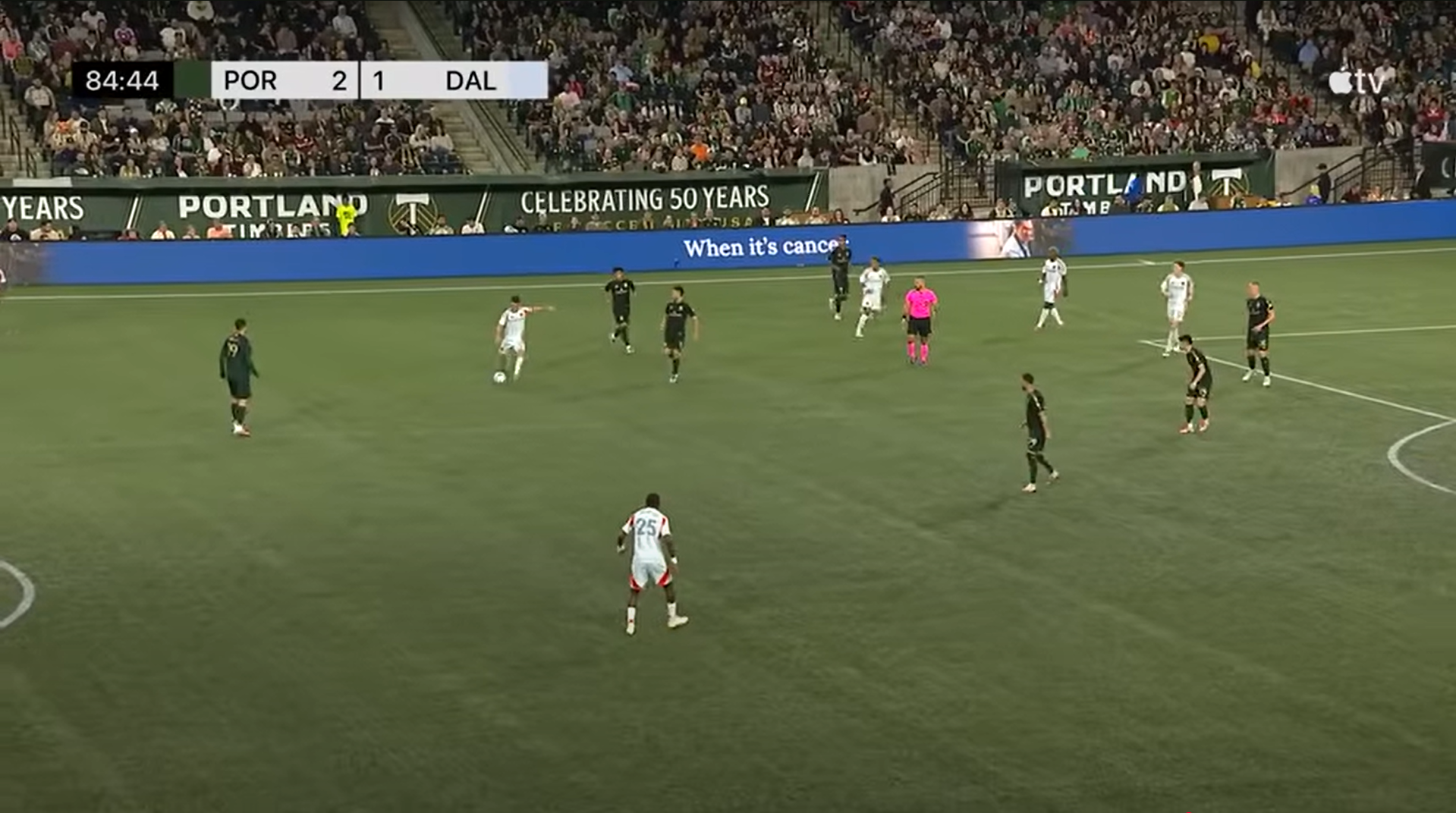
Here’s where we start. Ramiro is going to hit a diagonal ball to Musa in the box. Despite holding onto a one-goal lead, no Timber pressures him.
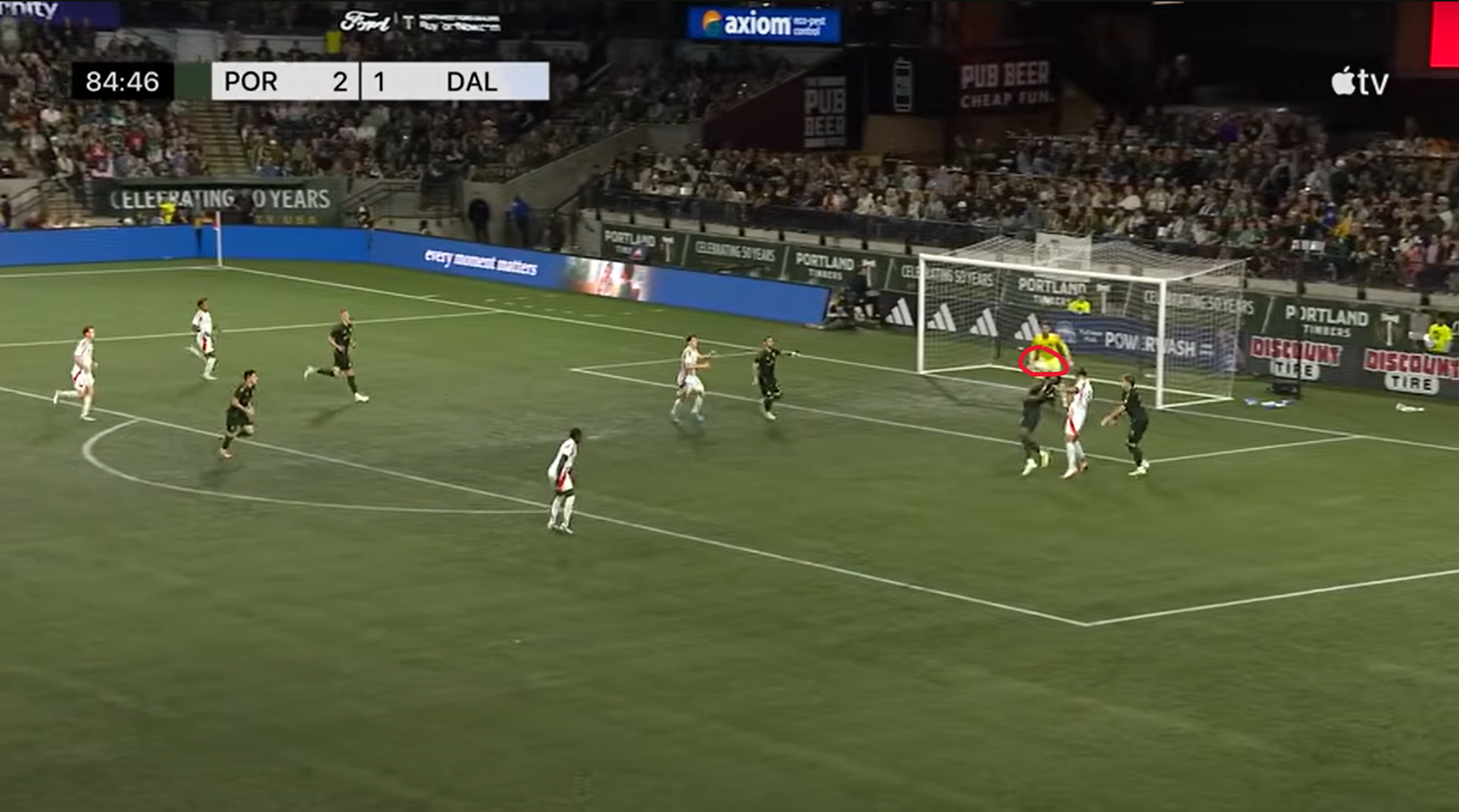
Musa is sandwiched by Ian Smith and Jimer Fory. He wins the header. He’s a very good player. Suddenly, the Timbers are outnumbered in their own box.
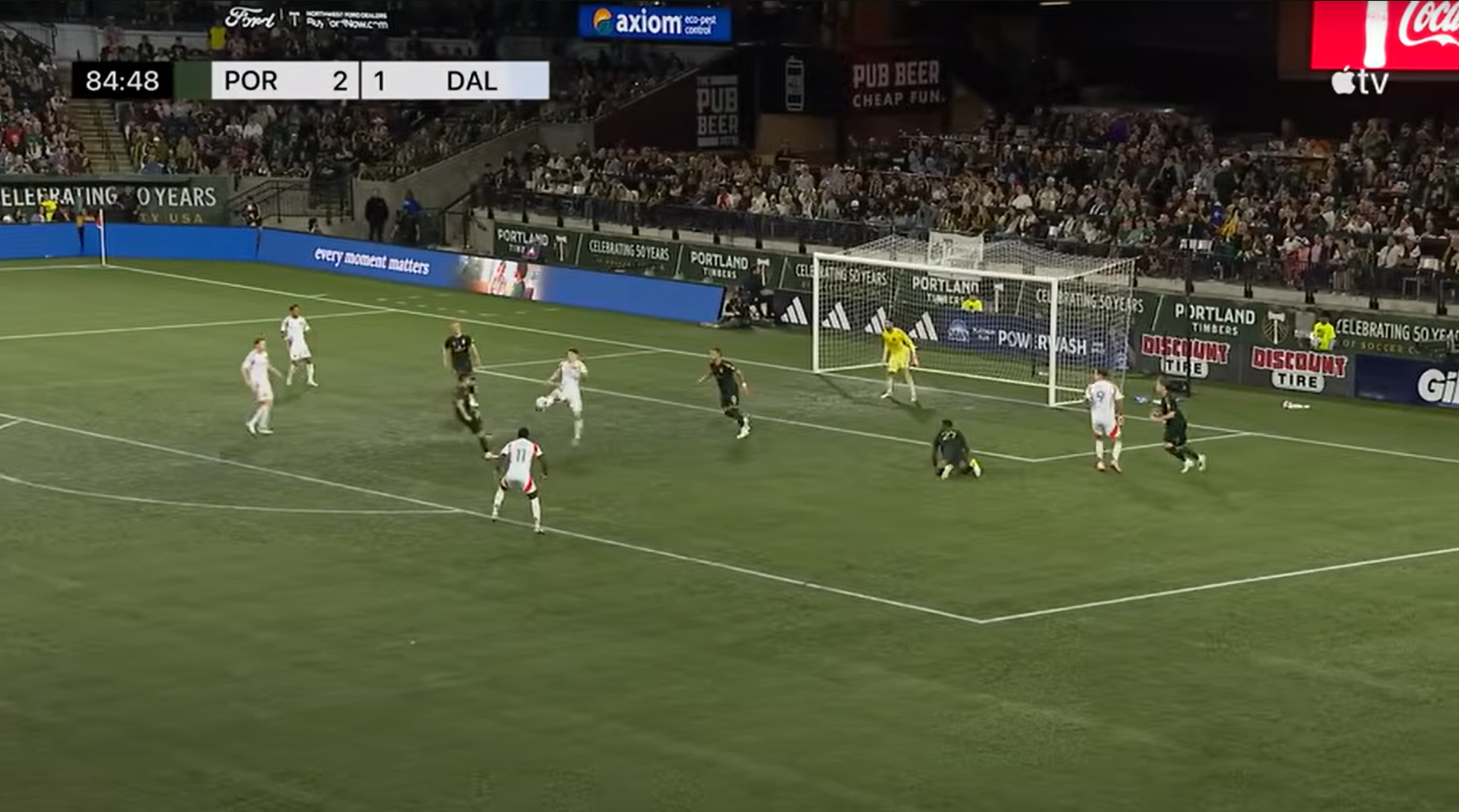
Because they are outnumbered in their own box, Farrington is able to get to the knockdown header first. There is no immediate pressure around the Dallas forward. He was simply able to react quicker than the players around him; all of whom are Timbers.
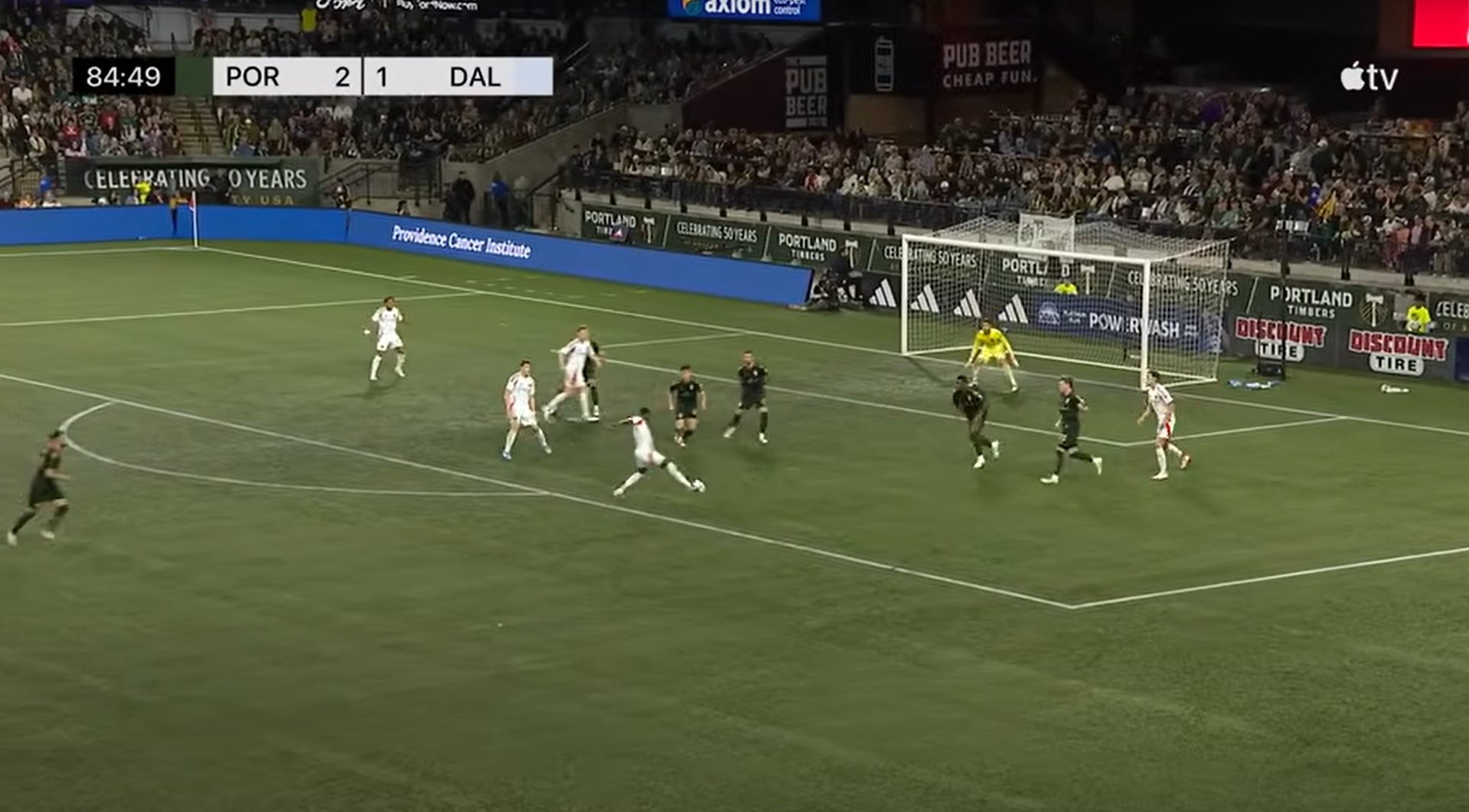
David Ayala makes an intervention, but his loose touch falls directly to Anderson Julio. The Ecuadorian is simply in the right place at the right time.
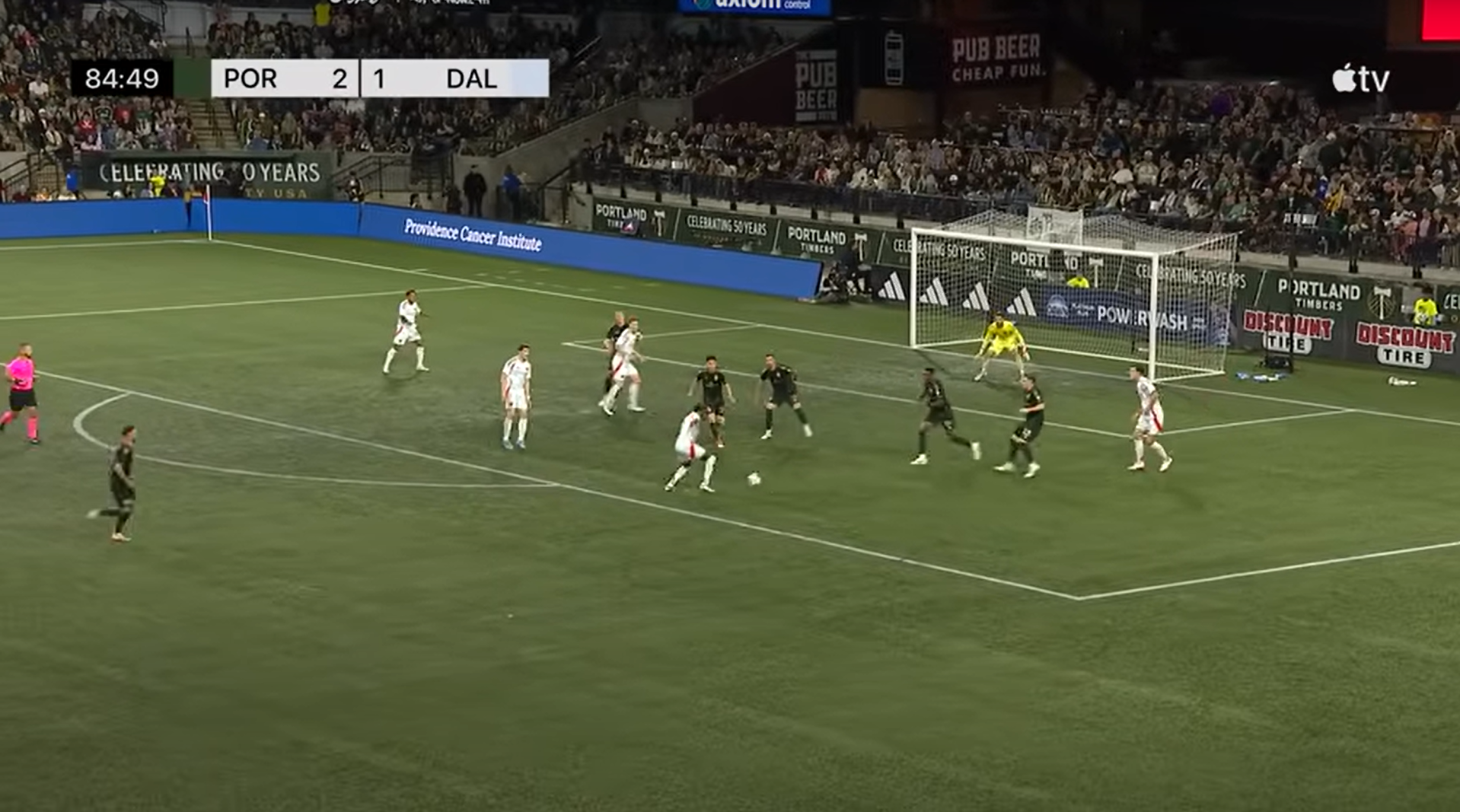
Julio has enough time to take a touch. Now 3 Timbers have surrounded him. Only a fool would take a shot from this position. But Julio isn’t a fool. He’s a creator of chaos. During his time with Real Salt Lake, he routinely tried to chip the opposing goalkeeper from the halfway line. He even succeeded once. One of those chip attempts was last year against Maxime Crepeau, who is not in goal for this current play. The current goalkeeper is James Pantemis, who has saved every shot he’s supposed to at this point in the game. It’s going to take a lot to beat him.
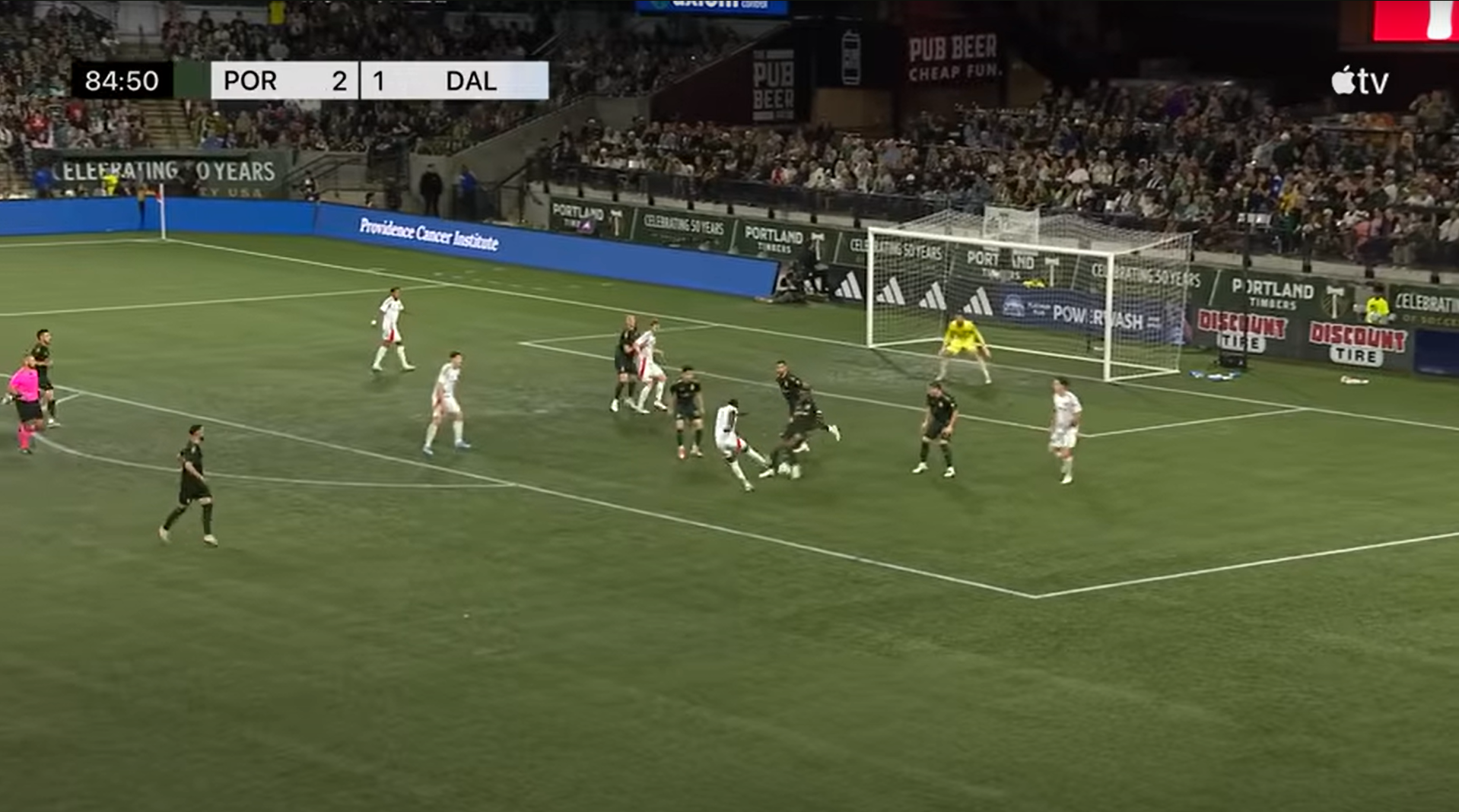
Julio unleashes. It’s a rather weak attempt, and ironically it’s the most pressure Portland has been able to bring in this entire sequence. The ball squirts through Fory’s legs.
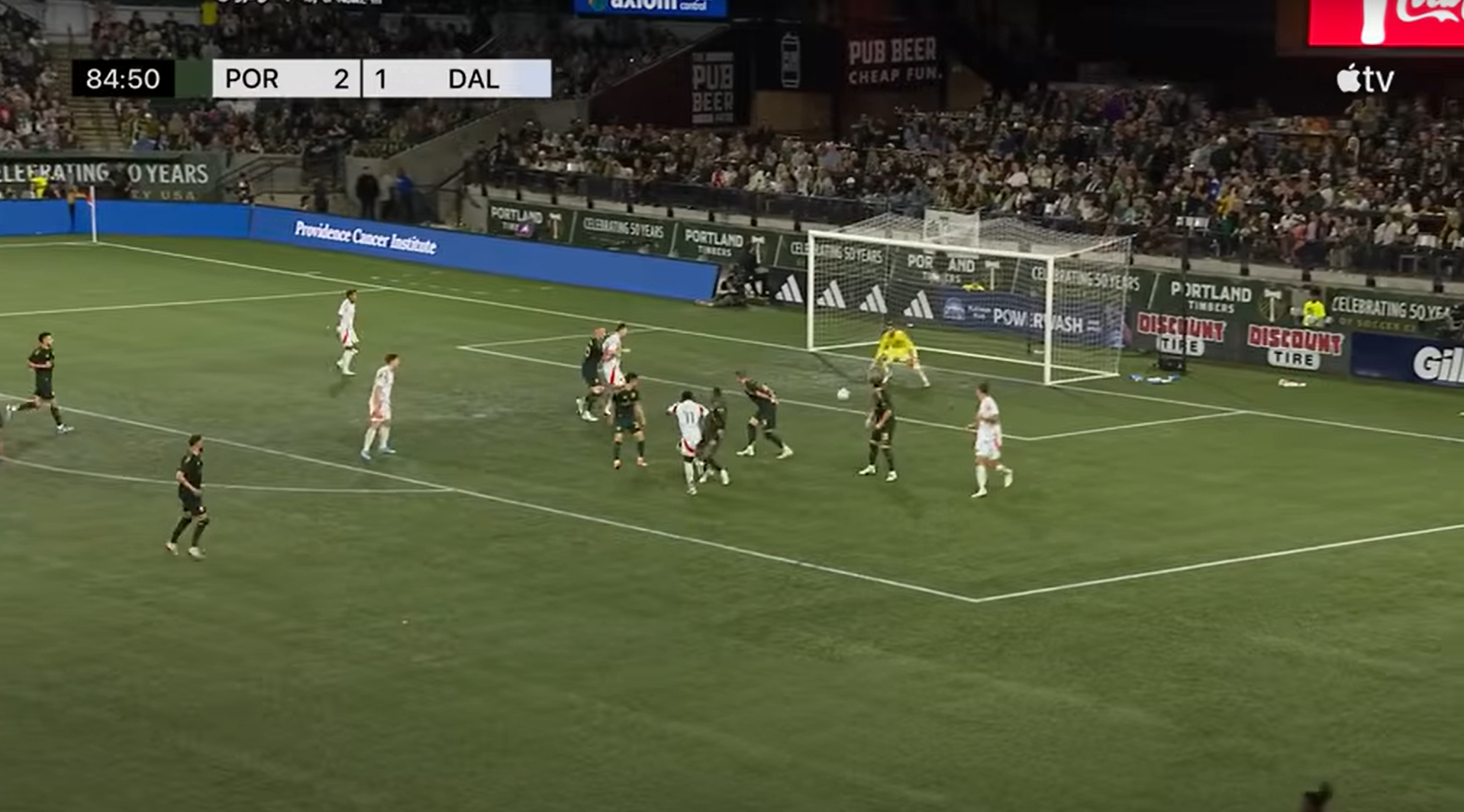
That initial deflection sends the ball on a peculiar course. But Pantemis has calculated for that. It’s still going towards the far post like Pantemis predicted. However, Dario Zuparic is behind Fory. The ball deflects off of Zuparic as well.
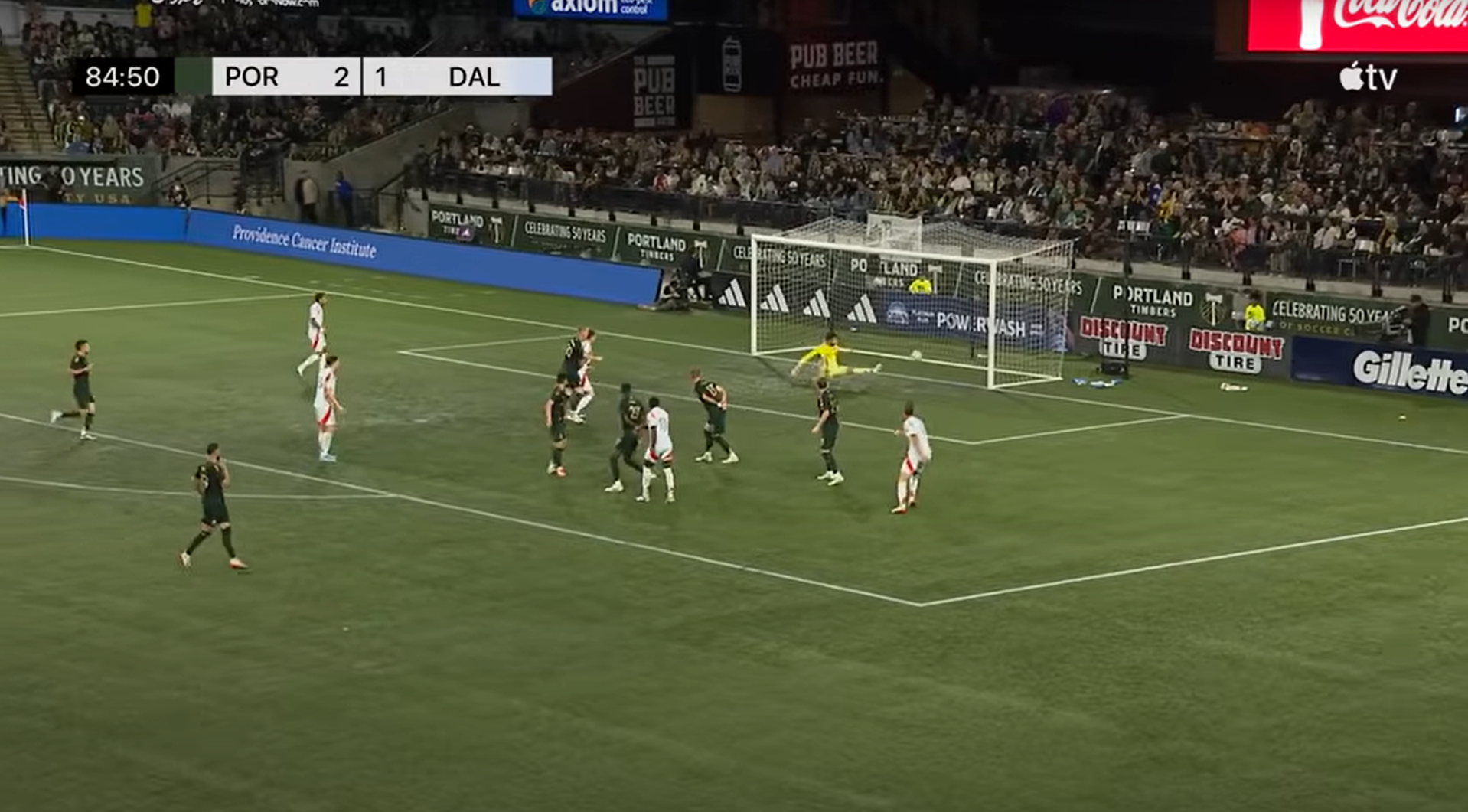
Pantemis had the far post covered, but Zuparic’s deflection sends the ball towards the middle of the goal. The Canadian goalkeeper has already cheated to his right side, so he has to scramble as the ball heads towards his left. As a result, it trickles in over his outstretched left leg. It’s incredibly unfortunate, but everything leading up to it was preventable.
Pantemis spoke after the game, saying “The bounces didn’t go our way.” What the Timbers are still learning is how to control those bounces. This isn’t football, where an oddly-shaped ball will bounce at random after hitting the turf. The spherical nature of a soccer ball makes it pretty easy to predict where it will go, unless two deflections occur in front of it. The Timbers have an unfortunate habit of failing to control these bounces. As Dallas proved during this equalizing goal, their second of the game, these bounces can be controlled by positional discipline.
So many potential second balls rolled into open space and were quickly scooped up by Dallas players in this game. It’s a theme I could point out in every Timbers game this year. When the Timbers are in position to make a tackle, they usually do. But more often than not, those loose balls fly into acres of open space, with opposition players showing the correct amount of hustle and awareness to make a recovery.
Portland’s 3-4-3 structure is supposed to give them, well, structure. But this formation and the application of Phil Neville’s tactics force both of Portland’s central midfielders to cover a lot of ground. It’s incredibly easy for teams to overload one side and force Portland to desperately and (keyword) instinctually defend the far side.
But Pantemis’ quotes have another meaning (probably unintentional (or not! He also said in this press conference “I wish you could be in my mind because a lot goes on,”)). There are bounces of the ball that the Timbers cannot control.
Officiating
Before I get into the two controversial moments, I’d like to talk about the PRO special: a borderline Portland foul that always gets called and nullifies a promising Timbers counterattack.
In the 51st minute, Smith headed a ball into space for Velde. The Norwegian promptly began a race with Sebastien Ibeagha for the ball. After some contact, Ibeagha goes down, and the whistle is blown with a point in the direction of Portland’s goal. This happens all the time, and no amount of illustration will change it. Somehow, this call is the only thing that PRO can be consistent about.
Now we get to the first penalty shout in the 25th minute. Velde delivers a diagonal cross into the box for Mora, and two Dallas defenders are on hand to try and challenge for the ball. One of those defenders (Osaze Urhoghide) gets all Mora, no ball.
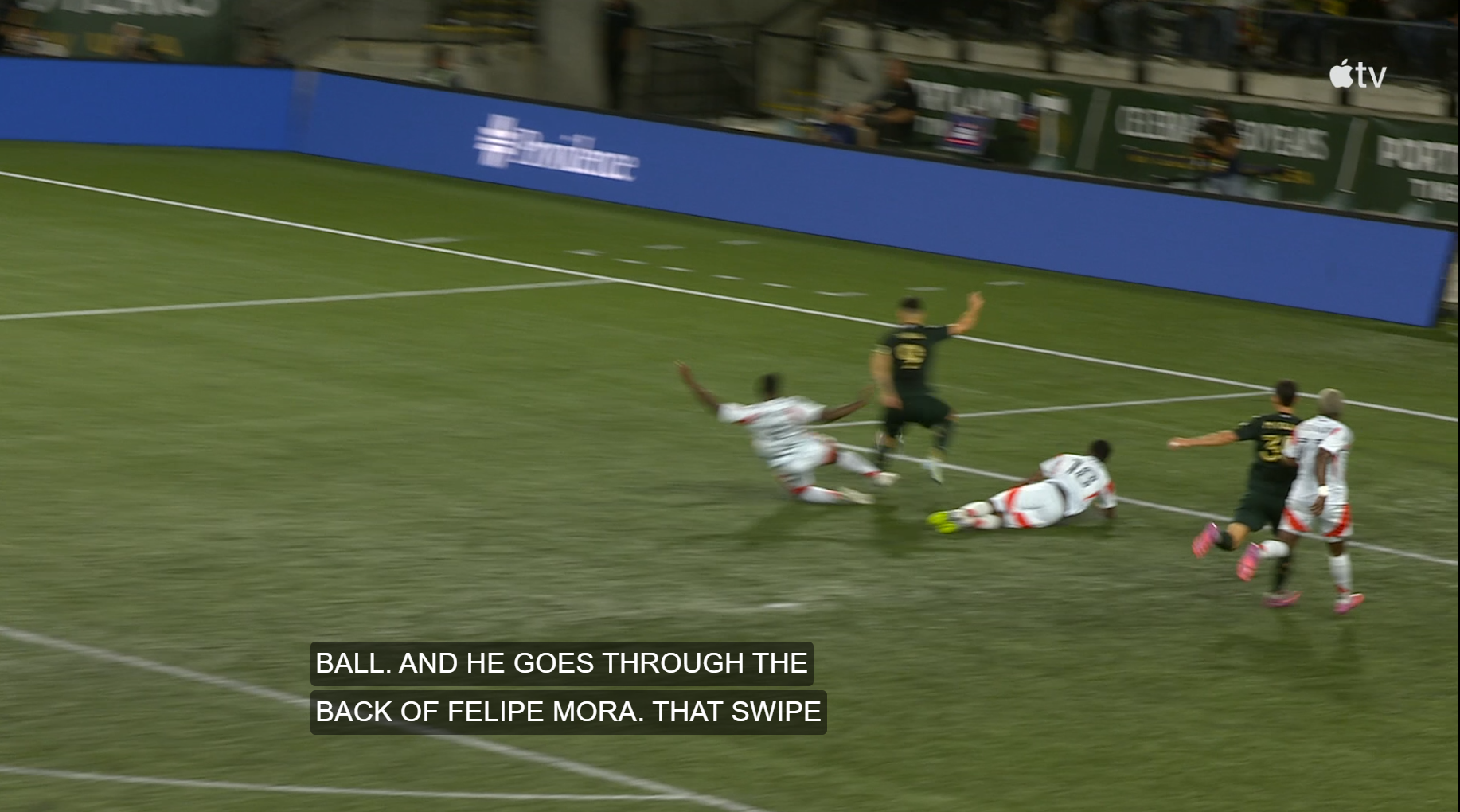
Those words are from color commentator Jamie Watson, who is very clear about the play that has just occurred. Center referee Chris Penso is looking right at it, but his viewing angle is from behind the Dallas defenders. He cannot see the contact that Urhoghide has made with Mora’s left leg. So he signals for a goalkick, but VAR official Geoff Gamble is also looking at this play while Jacob Jackson is gearing up for the restart.
The “smoking gun” angle is the one from this screenshot. Mora is definitely fouled, and Urhoghide has completely left his feet to make this tackle. However, Gamble doesn’t see anything “clear and obvious” and doesn’t recommend a trip to the monitor. Penso blows his whistle, and play resumes.
Why even have VAR, right? This is why it’s here, for plays exactly like this. Sigh.
Our next penalty shout comes in the 59th minute.
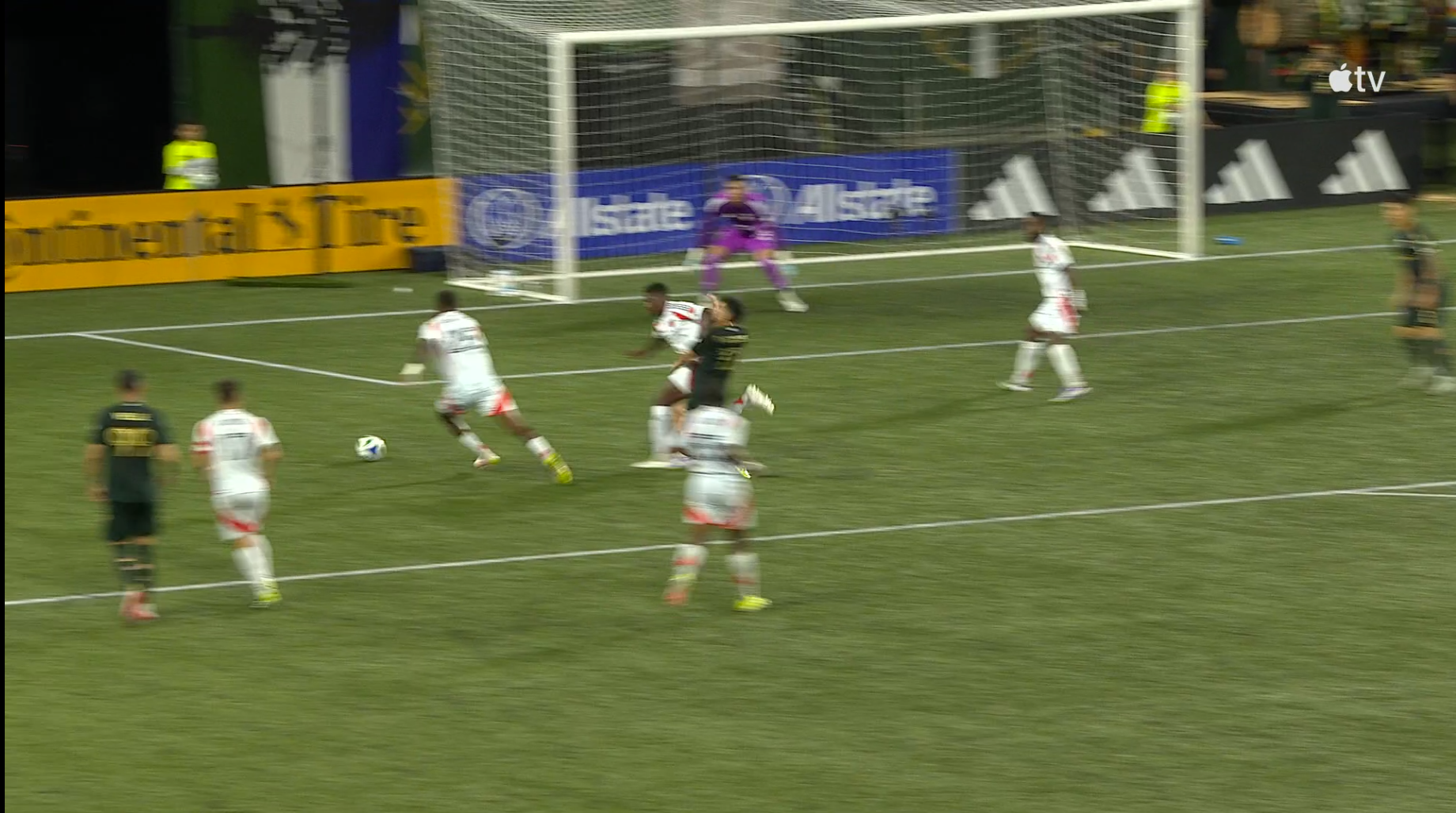
My initial thought on this one was “no penalty.” I did waffle a bit when I saw the initial replay, but after several viewings it’s pretty clear that Paredes brings Urhoghide down more than Urhoghide brings Paredes down. This is the right call. It’s frustrating, sure, but it’s a bang-bang play with two players fighting for a loose ball.
Finn Surman’s PK is very clear and obvious. However, Penso went to the monitor to check for DOGSO.
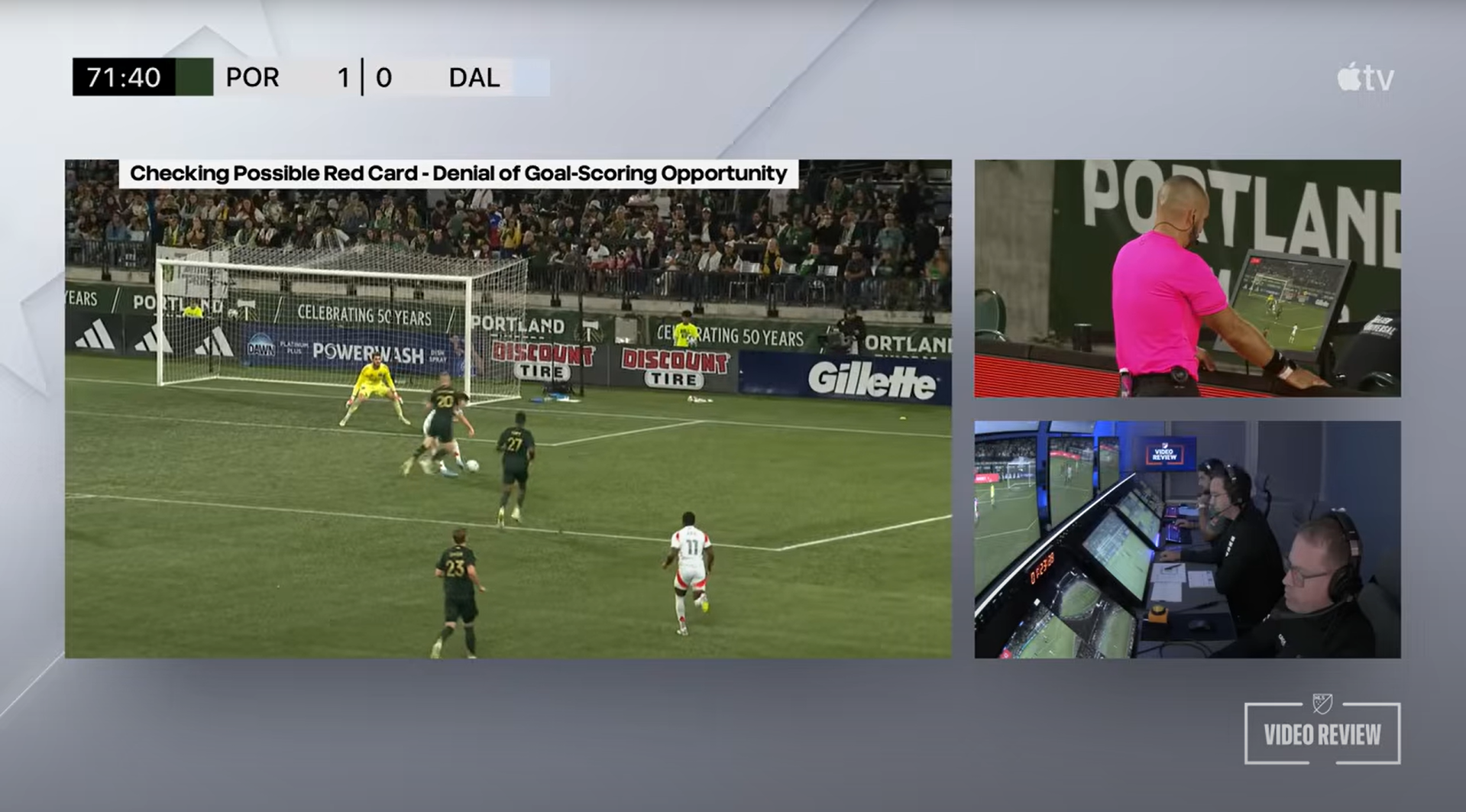
This call on the field was unchanged because of the “double jeopardy” rule. A player cannot be awarded a red card for DOGSO if the foul occurs inside the penalty area and a penalty is given. The Timbers have actually gotten away with this rule being incorrectly utilized before. Last year against San Jose, Bruno Wilson’s handball on the goal-line resulted in a PK and a red card despite the actual infraction seeming unintentional. I thought this was a really harsh decision, and I’m glad to see the rule correctly applied here. However, it would be a lot better if this rule was consistently applied across all MLS matches.
PRO is inconsistent at their best and harmful at their worst. I don’t think Penso had a terrible game. His performance was average by PRO standards. That’s just what the best officials in the world (obvious sarcasm) bring to MLS each week. It’s been a while since officiating played a big role in a Timbers game. However, this game got me thinking about a question posed in the Timber Review Discord several days ago. I think I’ll have to answer it ahead of the Decision Day game against San Diego just to see if there is a correlation.
Meanwhile, the actual officiating story involved tonight’s 4th official. In his post-game press conference, Neville repeatedly told reporters how disappointed and angry he was with the conduct of the 4th official during this game. His main descriptor was “rude.”
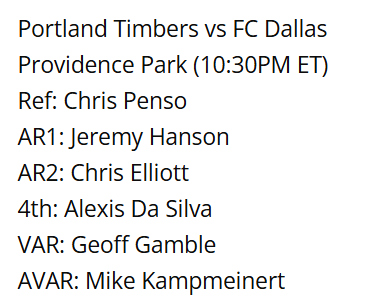
This doesn’t surprise me one bit. Alexis Da Silva has been the center referee for two Timbers games in his career. The first was last season’s 1-0 defeat at home against Austin. In my recap of that game, I said the following:
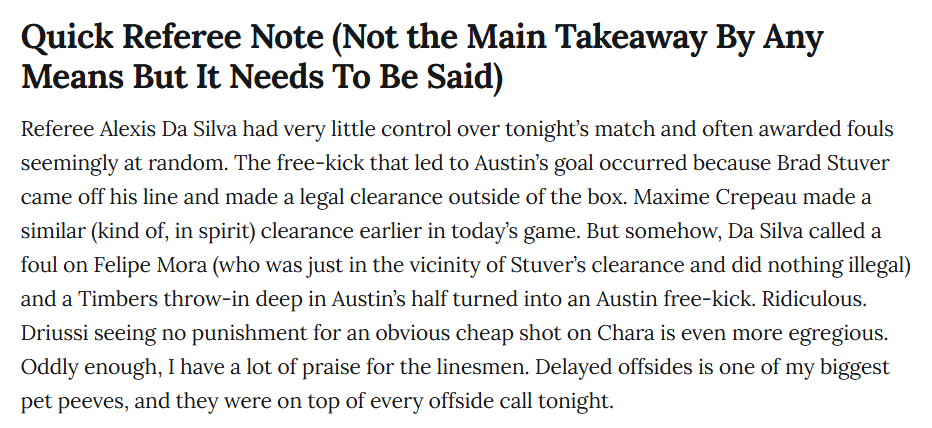
The other one was the 1-0 home defeat against RSL earlier this year. In my recap of that game, I said the following:
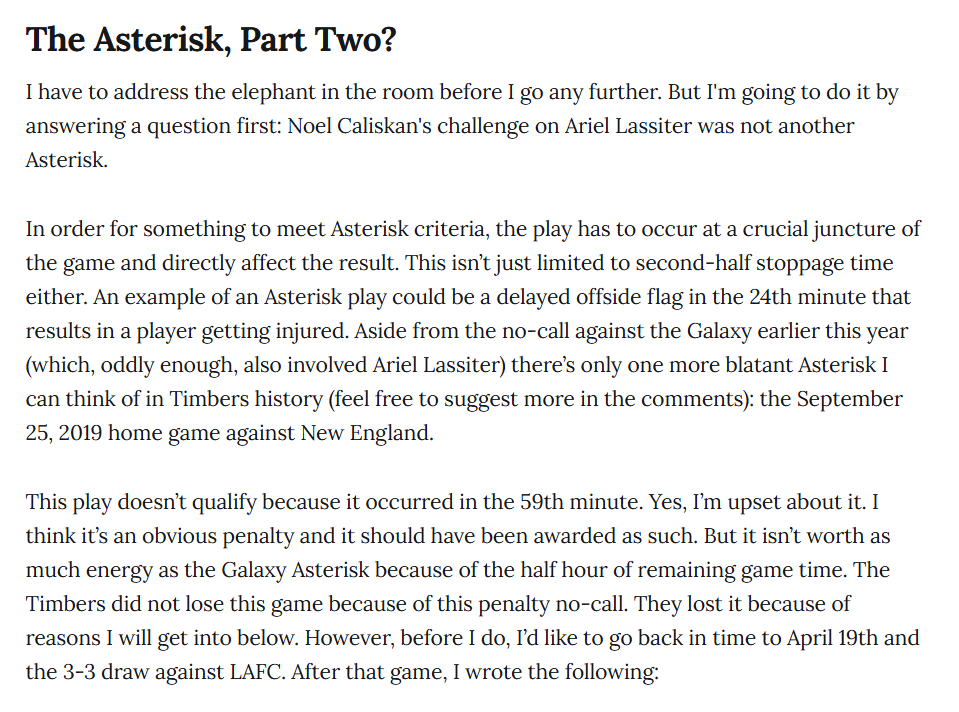
Yikes. If y’all want to see Neville’s full comments about the officiating, here’s a link to his post-game presser. I agree with some of the points (Velde’s fouls against and Mosquera’s yellow card) but I don’t think the supposed corner kick he mentions was touched by Jackson. I thought it went underneath his hand.
However, Neville’s words about the 4th official are very believable. The 4th official is the invisible member of the crew. Many people view him (or her, it’s 2025) as the person who holds up the board for stoppage time and substitutions. But the role of a 4th official is much bigger than that. They’re supposed to act as the bridge between the bench and the field. An uncommunicative and rude 4th official is very bad for the game.
Player Ratings
James Pantemis: 8.5
This might be harsh considering the illustration of Pantemis being relatively helpless on Dallas’ second goal, but that number feels right. That double save in the 39th minute were the only two saves he made during this game. It was a well-taken penalty from Musa too.
Finn Surman: 8.3
The penalty gets a downgrade. I don’t think Surman needed to make that foul, and it’s a rare instance of his youth showing during a season of consistently excellent performances. Speaking of consistently excellent, how about that first half? How about the moment in the 50th minute where he intercepted a pass and carried the ball all the way to Dallas’ box? There were a ton of excellent Surman moments in this one, but that penalty overshadows all of them. It’s unfortunate, but that’s the way the game is analyzed (at least by me).
Dario Zuparic: 9
I have questions about Zuparic that I’ll try to answer in an upcoming article. There’s no denying how much the Timbers need a defender in his mold. With a routinely disorganized structure in front of him, he’s asked to put out a lot of fires. Luckily, he loves to put out fires.
Kamal Miller: 8.5
Back-to-back quality Miller performances. While his defense (and the worldie) stood out from Wednesday’s game, tonight his passing shone. Miller completed 7/8 long balls and did an excellent job of finding open passing lanes. In a backline that usually passes the ball short or over the top into space, Miller’s ability to break lines is a great tool to have. Was it a little harsh to sub him off in the 69th minute? I don’t think so. I’ll get to that later, but I think I know what Neville’s reasoning was.
Juan Mosquera: 6.6
Mosquera committed one foul, and it earned him a yellow card. It was not a yellow card foul. I thought he looked a little rusty, which made sense given his recent injury. At least he has the whole week ahead to regain some fitness. His favorite opponent is up next.
David Da Costa: 7.2
This is a really tough grade to give because this is the first game Da Costa played in the “Nagbe” role. As the progressive 8 and tempo-setter in the midfield, I thought he did a pretty good job. His defensive work, although a bit subpar, still exceeded expectations. It was weird watching the Timbers form a 3-1-5-1 in possession during the first half, and it had the exact effects that a top-heavy structure would display when the Timbers turned the ball over. Da Costa did turn the ball over a couple of times, most notably in the 67th minute when he didn’t notice (or wasn’t alerted) to pressure from behind him. He’s credited with one created chance. It happened in the 18th minute when he exchanged a few passes with Mosquera to draw the defense in before chipping the ball to the space that Mosquera was running into. The sequence ended with a shot and a corner kick.
The Da Costa question is very complicated. As the most polarizing player in Portland, the extremes tend to be the loudest voices. I thought tonight was an improvement on his outings from earlier in the week. However, the Timbers crave volume chance creation, and I don’t know if Da Costa will add that to the team this year. Those last two words hold a lot of power.
David Ayala: 9.5
You’ve heard Neville call him “the best midfielder in the Western Conference” multiple times since the start of 2024. He isn’t the most important player on the Timbers (that honor goes to Finn Surman) but he’s the team’s engine. 5 tackles, 2 interceptions, 4 recoveries, 4/4 accurate long balls, and 8 passes into the final third. In the 35th minute, he was wildly off balance after receiving a pass. He stayed up as gravity was doing its hardest to pull him down and completed an outlet pass to Mosquera before finally giving in to the Earth’s pull. As a gigantic fan of the NCAA Football video game series (not EA’s reboot, the original) I know when someone’s brain is flicking the right stick on the controller.
Antony: 8.5
Don’t worry, he’s going to get the Stathead treatment in a bit. However, his superpower must be discussed first.
As illustrated in tonight’s game (and on Wednesday in Vancouver) all Antony needs is one touch. If he can measure up to a defender and flick the ball past them, his world-class speed can instantly turn the loose ball into a counterattack. This exact move created several opportunities for the Timbers tonight. It can nearly be indefensible if a team isn’t properly structured to counter it.
Today’s criteria: 4 key passes, 1 tackle, 3 interceptions, 6 ball recoveries.
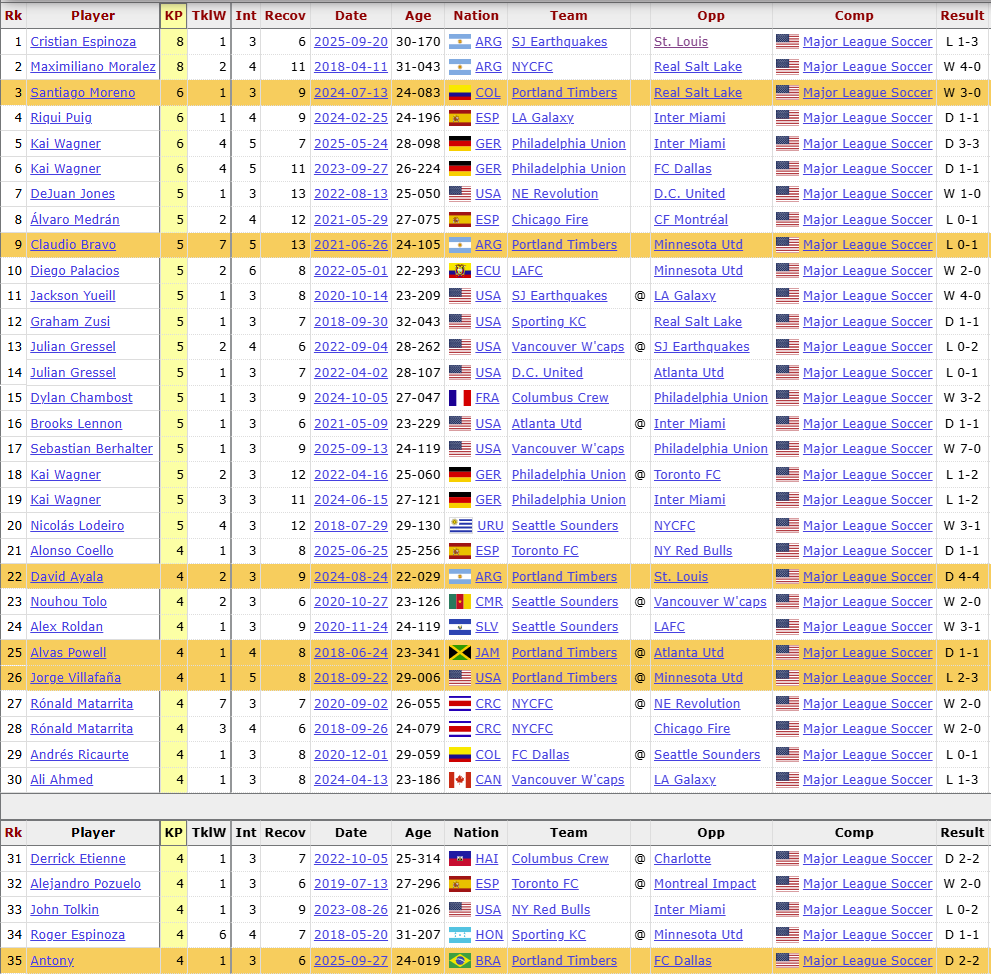
This has been accomplished 53 times in a MLS game. Antony’s performance (ranked by key passes) is 35th. Other Timbers to make the list have been highlighted. I thought it would be more special. I guess not. Still, it’s a very good performance from a player who is playing (partially) out of position. He played wingback on both flanks tonight. Great job.
Mati Rojas: 7
I don’t think Rojas was as electric tonight as he was against Vancouver. He was taken off at halftime due to a knock. Maybe it was from a hard Shaq Moore challenge in the 38th minute that led to a Musa shot that whistled wide of Pantemis’ left post. I thought he gave the ball away a bit, but there’s no denying his quality as a game-changer.
Kristoffer Velde: 9.1
Portland’s biggest game-changer is Velde. For the second straight game, he took 7 shots. For the second straight game, he’d like to have a few of them back.

Snark aside, Portland’s best chances came when Velde was involved. He forced an own goal before scoring his first real goal for the club. That pass to Paredes is the exact definition of “DP quality” that the Timbers have been missing all year. He’s already made a torrid start to his Timbers career, and the goal involvements are still coming. I wonder if he breaks that scoring duck next weekend?
Felipe Mora: 5.8
Did Mora have as bad of a game as this rating indicates? If you take his all-around performance into account, no. But he’s a striker, and he has to finish chances. Both of his big misses (detailed in the “Recap” section) could have completely changed the game. Although I’m very complimentary of his all-around game, it’s beginning to suffer due to his goal drought. Several of his first touches (usually elastic) were completely off tonight. He was given multiple chances to score, and simply couldn’t. That goal drought has reached 20 games. Dear Lord.
Ian Smith: 6.3
This was a largely anonymous performance from Smith, who earned his yellow card. In the 53rd/54th minute, Velde and Paredes were finding spaces between Dallas defenders to make runs. Smith had the ball at his feet and opted not to play the ball into space behind Dallas’ defense, which was more disorganized on that side. He’s still a good player who has earned his playing time, but there’s a lot of growing for the rookie. Those are learning moments, first and foremost.
Cristhian Paredes: 8.7
Paredes’ outing took place entirely in the second half. During that time, he scored a go-ahead goal while also giving the ball away quite a bit. He is Portland’s most dangerous “non-attacker” around the opposition box, but he can be hard to watch in the midfield with the ball at his feet. His first touch is among the worst on the team.
But that goal was brilliant. Making the run is one thing, but being able to perfectly finish that ball past Jackson was outstanding. That’s his 3rd goal of the season across all competitions.
Omir Fernandez: 7
Prior to tonight’s cameo, Fernandez hadn’t seen the field since July 16th against Cincinnati. I think he gave a pretty good account of himself on the pitch. It’s worth noting that Portland’s depth allows for many different players who can play many different roles. Tonight, Fernandez’s role was most needed, so he got some playing time. I liked the moment in the 78th minute when he lost the ball but tracked back to get it again. Little plays like that are pretty sweet.
Jimer Fory: 6.7
Fory’s rust was apparent, and he had more injury questions than Mosquera heading into this game. I don’t think he had a memorable moment outside of his (unfortunate) contribution to Dallas’ second goal (he wins that initial header if he times the jump right). Maybe the acrobatic clearance in the first minute of second-half stoppage time?
Kevin Kelsy: 7.5
Kelsy impressed me today with one thing that has been a weakness for him all year: decision-making. I don’t think he made a bad decision at all during this game. He knew where to play the right pass and played it. In only 17 minutes on the pitch, he created two chances. And they were pretty good ones!
Coach Rating: IDK
Do I believe that Neville gave the Timbers a good platform for success? Yes, although I’m still not sold on the Da Costa pivot idea. Particularly after seeing what it did to the team’s rest defense shape. I like the idea of going with a very attack-heavy lineup, but I thought it brought some imbalance to the team’s 3-4-3 structure. The changes were fine, and I don’t think they dropped Portland’s level.
But, somehow, this team keeps dropping points. This is the fourth time in the last 11 games that the Timbers have allowed a late goal in the 80th minute or later that caused them to drop points (RSL home, Minnesota away, Vancouver away, Dallas home). I do think that reflects a bit on coaching, but it also reflects on this team’s inability to keep the ball. I think the pressure to add a second goal gets in the back of players’ minds. Think about it. The Timbers haven’t won a game by multiple goals since April 27th. In that game (the 4-2 win against the Galaxy) they coughed up two goals in the span of three minutes to turn a 3-0 game into a 3-2 game. It’s something they’ve struggled with all year. Is it mentality? Is it coaching? Is it their inability to keep the ball under pressure? That question needs to be answered because it’s a laundry list of things that Neville can and can’t control.
Table Time
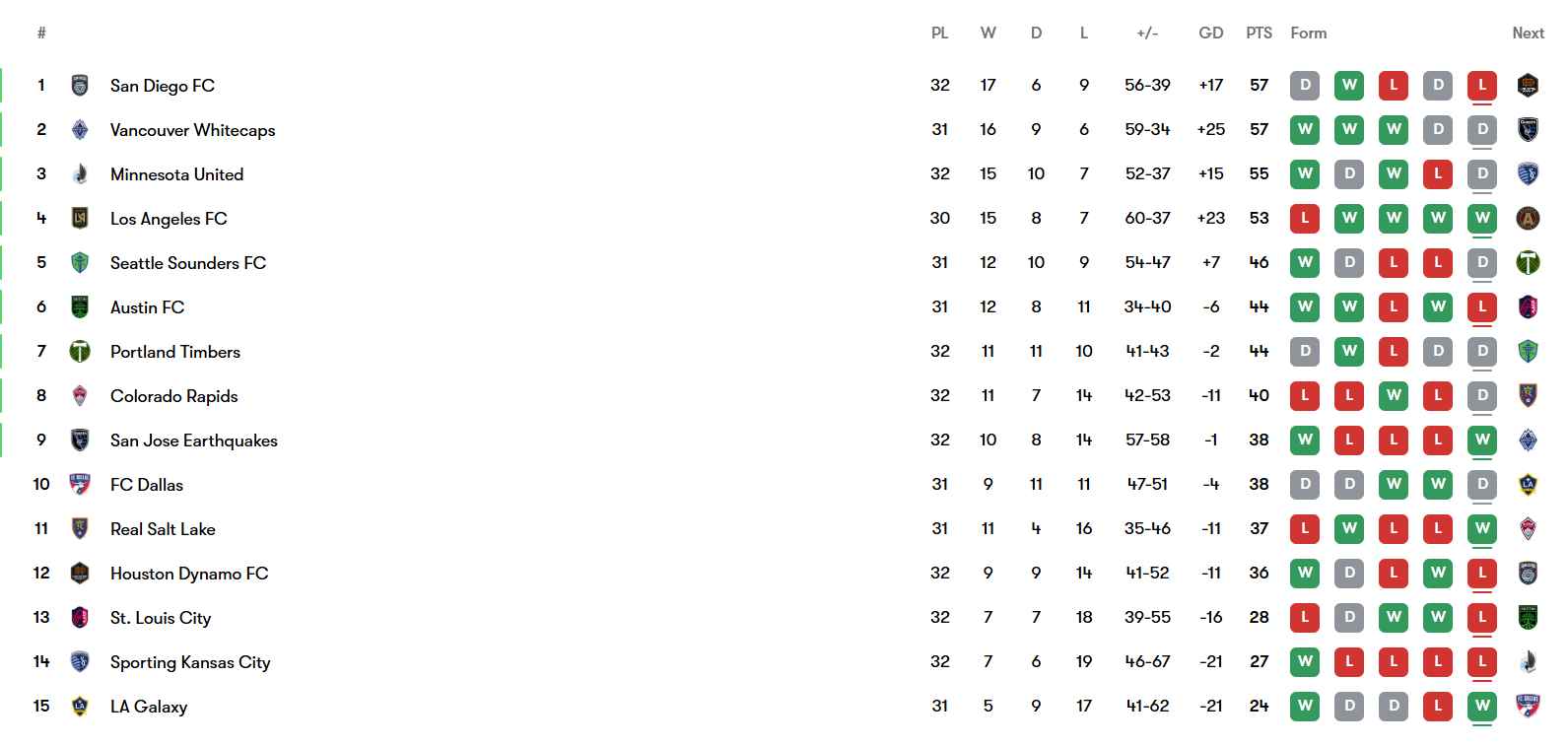
This is really funny if you think about it. Portland dropped crucial points at home, and they’re still 4 points clear of the Wild Card game. Only 4 Western Conference teams won on Saturday: LAFC (juggernaut meter is extremely high), San Jose (welcome back Quakes), RSL (thank you for beating Austin and fighting until the bitter end) and the Galaxy (SKC is a complete mess). Only one team that began Saturday in the playoff spots was able to taste victory. However, once again, the Portland Timbers have failed to capitalize when all the results went their way.
If they were able to see out this game, they would’ve ended tonight in 5th place. They would’ve put even more distance between themselves and the Wild Card. And, crucially, they would’ve qualified for the playoffs. This race isn’t close, but it really is. 5th place and above have already clinched their spot in the postseason. 6th to 12th are still alive. Dallas’ unbeaten streak continued, while the Timbers have only won a single game in their last 8 since Leagues Cup ended. That game was against the New York Red Bulls, whose playoff streak is hanging by a thread after losing to their cross-river rivals.
Each of these 8 games have been somewhat winnable. But the Timbers’ inability to find the winning goal or prevent the tying/winning goal has been the defining trait of this late-season run-in. Their only saving grace has been the utter failures of the teams beneath them to take advantage of this incredibly frustrating run of form. They’re being kept up by the incompetence of their neighbors.
Final Whistle
Throughout this stretch, the Timbers have been punished. Not in the “belt-to-ass” sense, but in a way that evokes the fateful canoe.

This is the stupidest boat ever designed. In order to properly control the canoe, every single stroke of the paddle has to be perfectly in sync to prevent the most predictable of disasters: a canoe tipping over.
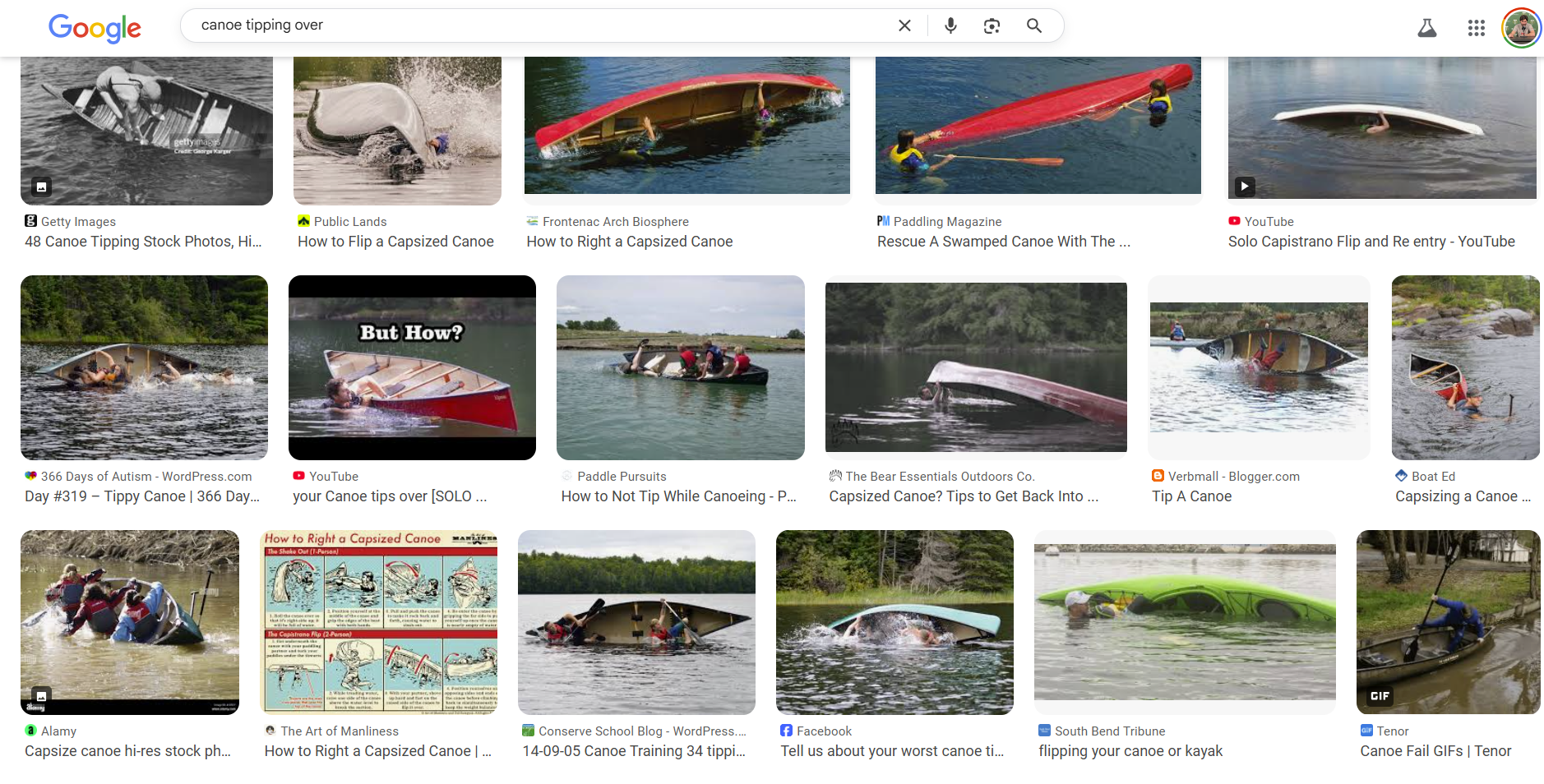
This is what the canoe is born to do. Every canoe is crafted with the utmost precision to ensure the inevitable tip. Boats like a kayak can be navigated by a single person. Some kayaks are large enough for two people. The kayak is perfectly designed. Only complete mismanagement of the boat will cause it to tip over. But the canoe is different. It desperately wants to flip upside down. This boat cannot handle a single navigator. Keeping a canoe afloat is a team effort. Even the slightest mistake by a paddler can result in disaster.
The 2025 Portland Timbers are tied to their canoe. As they continue to be held together by the slightest of margins on the pitch, their boat is constantly in danger of flipping over. But they made this choice. On some days, the canoe floats on a crystal-clear lake. The Timbers do not properly steer the canoe, and it tips. However, when the canoe is on a raging river, their instincts as boat drivers kick in. They’re able to manage the rough waters and come out unscathed. This is the story of their season.
Their canoe can flip over at any moment. Yet they must keep paddling. Anything and everything can cause embarrassment of the highest order. The pictures above only show a still from the stages of a canoe failure. Canoe failures are far more common than canoe successes due to the fine margins that each paddler has to navigate individually while still doing their part to keep the canoe afloat. Have you ever seen a canoe tip over in person? Did you laugh when it happened because you knew that was the only inevitable outcome of sitting in such a stupid boat?
Those people inside the canoe are not happy. But it’s the fate that they chose themselves. Every single bounce of the ball, every deflection, every missed penalty call, every shot that whistles just wide of the post. These moments matter so much because the margin for error is so low. Portland knows when to paddle in those dangerous waters where many would expect the canoe to shatter on the rocks. However, when those calmer waters appear, they let their guard down. They forget the desire of the canoe to invert suddenly and dramatically under the slightest error.
During this season, the Timbers have survived multiple dangerous rivers. Some of them haven’t been conquered, but surviving can be a point of pride itself. However, these calm waters keep them from reaching their full potential. It’s utterly shocking. How do they survive the danger yet capsize hilariously in a clear, still lake?
Portland has held on to their canoe for far too long. At this point in the season, it might be too late to ditch it. It’s come this far with them, and they’re obviously attached to this useless vessel. They’ll spend the final two games of the season with it in tow, fighting to keep it afloat despite its desperate attempts to tip over and send the entire team into the cold water.
I don’t have to mention how big next weekend is. Portland’s playoff hopes are still alive. Their odds (not sportsbook, just gut) haven’t changed over the past month despite their constant failures to keep their canoe upright. But a reckoning might be coming, and the Timbers will be tested by their desperate rivals who have taken to the trusty Viking longship. They’ve lost tons of sailors over and over again throughout the season, but there’s always someone ready to replace a man who went overboard. They use the sea like they were born in it; authoring voyages and bringing back treasures that the rest of the league still try desperately to grab for themselves. And somehow, despite all of their success, they cannot defend their home turf against the stupidest boat in existence. Next weekend is the big one, and the Timbers are bringing a canoe to another naval battle. The climb continues.

